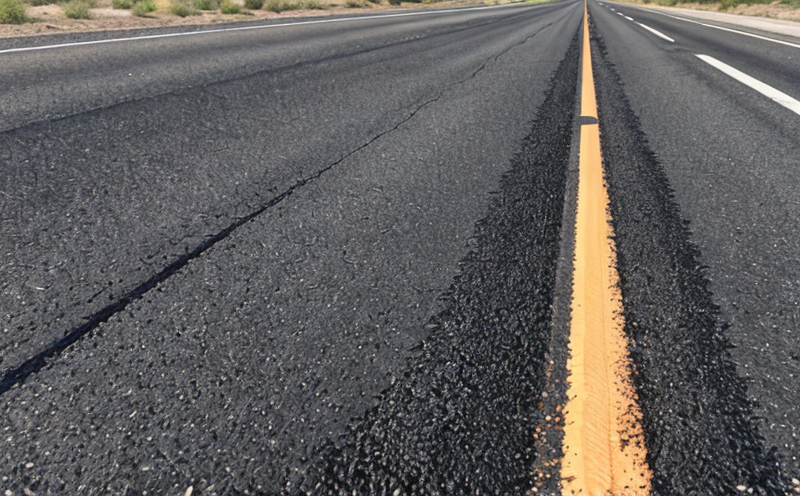ISO 14023 Aging and Weathering Resistance
The ISO 14023 standard is a critical component in the evaluation of materials' resistance to aging and weathering, which are essential for ensuring the longevity and durability of asphaltic products used in building and infrastructure projects. This standard provides a robust framework that assesses how well these materials hold up under environmental conditions such as temperature fluctuations, ultraviolet radiation, humidity, and moisture.
The testing protocol outlined by ISO 14023 is particularly vital for the building & infrastructure sector where durability of materials can significantly impact project longevity and safety. In the context of asphalt and pavement testing, this standard helps identify materials that are more resilient to environmental stressors, thereby reducing maintenance costs and enhancing overall sustainability.
The process involves exposing samples of asphalt products to controlled conditions designed to simulate real-world weathering effects. This typically includes exposure to high and low temperatures, humidity cycling, ultraviolet radiation, and sometimes water immersion or spray. The specimens are then visually inspected for changes in color, texture, adhesion properties, and other physical characteristics indicative of aging.
Testing according to ISO 14023 is not just a compliance requirement; it's an essential tool for quality assurance and product development. By understanding how materials behave under these conditions, manufacturers can make informed decisions about formulation changes or material selection. This ensures that the final products meet both performance expectations and regulatory requirements.
Furthermore, results from ISO 14023 testing provide valuable data for research and development efforts aimed at creating more sustainable and durable materials. The insights gained can lead to innovations in asphalt technology that improve not only environmental sustainability but also operational efficiency and cost-effectiveness.
The importance of this standard extends beyond the laboratory into real-world applications where maintaining high-quality infrastructure is paramount. By adhering to ISO 14023, construction companies ensure they are using materials that can withstand harsh conditions, extending the lifespan of roads, pavements, and other critical infrastructure.
In summary, ISO 14023 aging and weathering resistance testing plays a crucial role in ensuring that asphalt products meet stringent quality standards. It helps manufacturers produce more resilient materials while also supporting sustainable practices within the building & infrastructure sector.
Why It Matters
The durability and longevity of materials used in construction projects are paramount for both economic and environmental reasons. Asphalt, being a key component in road construction, must be able to withstand the rigors of environmental stressors over its operational life cycle. ISO 14023 provides a standardized method to evaluate these properties, ensuring that asphalt products meet not only performance standards but also contribute positively to sustainability goals.
By conducting aging and weathering resistance tests according to this standard, stakeholders can make informed decisions about material selection and formulation. This ensures that the final product is capable of maintaining its integrity under various environmental conditions, thus enhancing the overall quality of infrastructure projects.
The results from these tests are invaluable for researchers and development teams looking to innovate within the field of asphalt technology. They provide critical data on how different materials perform in real-world scenarios, allowing for continuous improvement and adaptation to changing needs.
Applied Standards
The ISO 14023 standard is widely recognized and utilized globally for evaluating the aging and weathering resistance of materials. This international standard offers a comprehensive approach to testing, ensuring consistency across different regions and laboratories.
- Scope: The scope covers various types of asphaltic products including bituminous mixtures, modified bitumen, and related compounds used in road construction.
- Apparatus: Specific apparatus required for testing includes exposure chambers capable of simulating different climatic conditions such as temperature extremes, humidity levels, and UV radiation. Other essential equipment may include spectrophotometers for color measurement, adhesion testers, and mechanical testing machines.
The acceptance criteria defined by ISO 14023 are designed to ensure that materials meet specified performance thresholds post-exposure. These criteria vary depending on the type of material being tested but generally include assessments of physical properties like tensile strength, elongation at break, and adhesion.
Use Cases and Application Examples
- New Asphalt Pavement Design: Engineers use ISO 14023 results to select materials that will perform optimally in local environmental conditions, ensuring longer-lasting pavements.
- Sustainable Materials Innovation: Researchers can leverage the insights gained from these tests to develop more environmentally friendly asphalt formulations.
- Maintenance Planning: Maintenance teams use the data obtained from aging and weathering resistance testing to plan maintenance schedules effectively, extending the life of existing infrastructure without compromising safety or performance.





